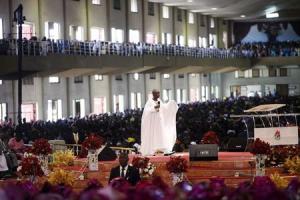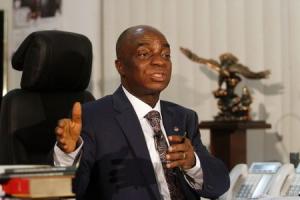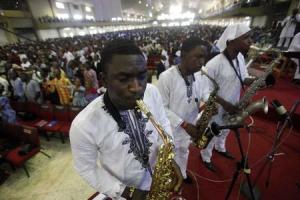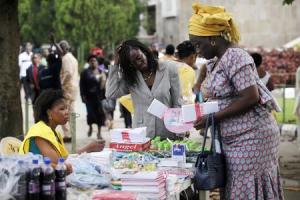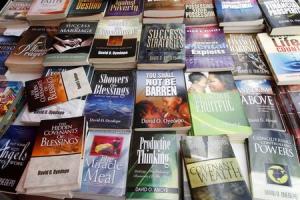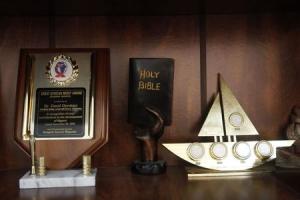Chad Fights Boko Haram in Nigeria as Call Goes Out for Regional Force
Chadians Clear Islamist Insurgents from Nigerian Town of Mallam Fatori
Soldiers of the Chadian army at the border between Nigeria and Cameroon on Jan. 21. Chad sent a convoy of troops and 400 military vehicles into neighboring Cameroon to battle Boko Haram on Jan. 17-18. PHOTO: AGENCE FRANCE-PRESSE/GETTY IMAGES
Chadian military forces liberated a Nigerian town from Boko Haram militants on Friday, hours after the African Union’s top official called on Nigeria’s neighbors to contribute to a 7,500-strong multinational force to combat the Islamist insurgency escalating beyond the country’s borders and prevent the destabilization of the West African region.
Troops from Nigeria’s neighbor launched their attack on Wednesday, a local military official said. A spokesman for the Nigerian army confirmed the Chadians had cleared Boko Haram from the Nigerian town of Mallam Fatori, and said the operation had been coordinated with Nigeria’s military, also operating in the area.
Chad’s military presence in Nigeria and the African Union’s call for a multinational military operation to push back the militant group underscore both Boko Haram’s reach and the region’s frustration with Nigeria’s failure to contain it.
The call to arms for Nigeria’s neighbors comes at a politically sensitive time for Africa’s largest democracy and top economy.
President Goodluck Jonathan is in a tight contest for re-election, with security being among the main issues in the Feb. 14 vote. Despite having one of the continent’s largest armies, Nigeria’s military has failed to stop Boko Haram from slaughtering thousands of civilians and advancing toward major cities in the country’s northeast.
“The continued attacks in northeastern Nigeria, and the increasing attacks in the Lake Chad Basin, along the border with Chad and Cameroon…have ”far-reaching security and humanitarian consequences,“ Nkosazana Dlamini-Zuma, the chairwoman of the African Union, said in a statement released late Thursday. ”No efforts should be spared, as part of the AU counterterrorism agenda, to defeat this group.”
It is far from certain that Nigeria would welcome thousands of foreign troops on its soil for an extended period. President Jonathan’s government has largely opposed the idea, though in recent days the government has issued more conflicting opinions.She asked AU heads of state to approve her proposal for a multinational military force in their meeting Friday afternoon and said the technical details for the mission would be set out Feb. 5-7 at a meeting in Yaoundé, Cameroon’s capital.
On Thursday, the president told a crowd in the northeastern city of Yola that Nigerian troops had liberated the town of Michika again. Warplanes screeched overhead as he spoke.
Nigerian troops have traded control over Michika for months, with Boko Haram slipping into the town, preaching to its residents, recruiting young men and boys, then slipping out as warplanes swoop in, residents said. The Islamic insurgency first overran the town in September: resident James Sunday remembers them going house to house, reassuring the townspeople that Boko Haram wouldn’t harm them, so long as they practiced Islam.
A month later, military jets bombed the area, followed by troops, the military said. Boko Haram left the town—but weeks later, returned, reasserting control. A presidential spokesman told the British Broadcasting Corp. on Friday that the government welcomed the AU’s move to deploy a multinational force to help fight Boko Haram, but days earlier the country’s national security adviser told a conference in London that the foreign force wouldn’t help and wasn’t necessary.
The army has said it is open to foreign military assistance, as long as the entire effort is subordinated into its own command and control structure, a stipulation Nigeria’s neighbors have found frustrating.
Nigeria’s opposition candidate—a retired general tied neck-and-neck with Mr. Jonathan—has made an issue of the incumbent’s reluctance to accept foreign help.
In a recent interview, Gen. Muhammadu Buhari said he would “certainly” welcome an AU force if elected. “If we are in trouble it is only right that we accept their help,” he said Wednesday.
The ramping up of military assistance—from its far poorer neighbors—could be seen as an admission of an inability to cope by the incumbent president. But African leaders appear to have lost patience with President Jonathan, and the Nigerian government to stop the wave of horrific attacks.
“Boko Haram’s horrendous abuses, unspeakable cruelty, total disregard for human lives, and wanton destruction of property are unmatched,” Ms. Dlamini-Zuma said in her statement.
The proposed military force would fight against the Islamist militants, help refugees fleeing their homes because of Boko Haram assaults, and search for the hundreds the group has abducted, including the more than 250 schoolgirls still missing since April last year, according to the statement issued by Ms. Dlamini-Zuma.
She said that the United Nations should finance this new force’s operations through a trust fund and that the setup of the force should follow the template of similar ones in Mali, the Central African Republic and Somalia—all countries that in recent years have teetered on the verge of collapse because of civil conflict.
Still, the force proposed to halt Boko Haram’s rapid emergence as a military threat in Nigeria will be a fraction of the one deployed in Somalia, staffed with more than 22,000 uniformed personnel. The AU’s forces in Mali and CAR are also larger, counting more than 10,000 soldiers each.
The regional army to combat Boko Haram would be staffed with soldiers from Chad, Niger, Nigeria, Cameroon and Benin and be given a year to deploy to begin with, Ms. Dlamini-Zuma said.
—Gbenga Akingbule in Abuja, Nigeria contributed to this article
http://www.wsj.com/articles/african-union-calls-for-regional-force-to-combat-boko-haram-1422611046




